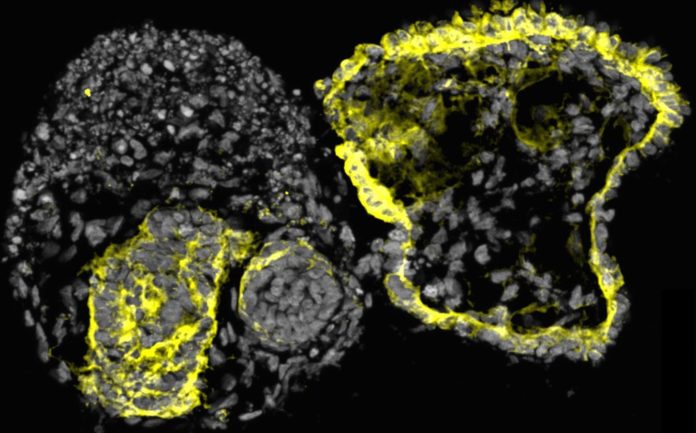In a new study published in Cell Stem Cell, scientists from Andy McMahon’s USC laboratory-created basic kidney-like structures called organoids and employed them to find out potential meds to treat adult-onset polycystic kidney disease.
The adult-onset form of polycystic kidney disease, which affects 8 million people globally, has an “autosomal dominant” pattern of inheritance, which means that the disease emerges when a person gets a faulty copy of the PKD1 or PKD2 gene and the function of the second good copy also disappears.
Large fluid-filled cysts develop in numerous areas of the kidney as a result of autosomal dominant polycystic kidney disease (ADPKD), which also poses a serious risk to the liver, pancreas, and heart.
The only FDA-approved treatment for ADPKD is tolvaptan, which only works in a subset of cysts made up of a certain type of kidney cell. It slows but does not stop disease progression.
To speed up the search for new treatments for ADPKD, first authors Tracy Tran, Cheng (Jack) Song, and his colleagues began with human pluripotent stem cells, which can either multiply to produce more stem cells or develop into a variety of specialized cells.
These pluripotent stem cells were employed to create organoids with one or more nephron-like structures, which are the filtering cells of the kidney.
The lead author, Professor McMahon, remarked, “these organoids are simple, reproducible, scalable, and cost-effective.”
Most crucially, cyst formation in ADPKD and key elements of normal human kidney development can both be accurately modeled by organoids,” according to the lead author.
Scientists showed that the organoids had many of the cell precursors and genetic markers that are needed to build a kidney in an embryo.
When the organoids were put into a mouse, the structures that looked like nephrons started to grow blood vessels and could even filter wastes in a limited way, which is one of the kidney’s most important jobs.
The researchers employed CRISPR/Cas9 gene editing to inactivate PKD1 or PKD2 to make the organoids relevant for researching ADPKD. The gene-edited organoids started to develop cysts as expected; these cysts finally separated and expanded to centimeters in diameter.
The researchers then conducted the initial screening to find possible treatment agents for ADPKD using gene-edited human organoids, concentrating on a group of enzyme inhibitors to provide a detailed understanding of the cellular mechanisms regulating cyst formation.
According to Song, a postdoctoral Amgen Scholar in the McMahon Lab, “our organoids proved to be very useful for identifying therapeutic drug candidates that merit further study for the treatment of ADPKD.”
After subjecting organoids to 247 different enzyme inhibitor compounds, researchers identified 9 that successfully slowed cyst growth without negatively impacting organoid development. One substance, quinazoline, worked especially well.
“In the future, organoids will become an increasingly powerful tool for modeling and understanding human disease, identifying potential treatments, and eventually, providing transplants to replace organ function for patients,” added Tran.
Image Credit: Getty
You were reading: Researchers Think They Have Found Potential Drugs For Polycystic Kidney Disease
